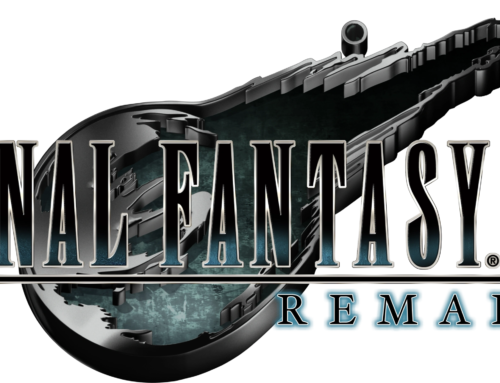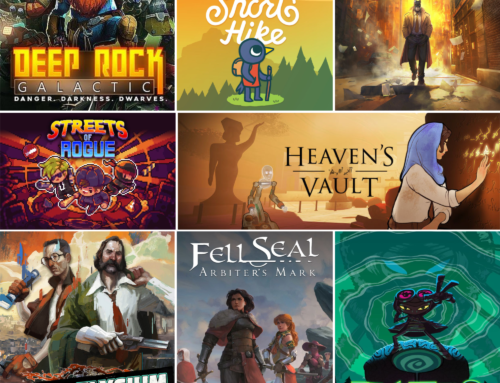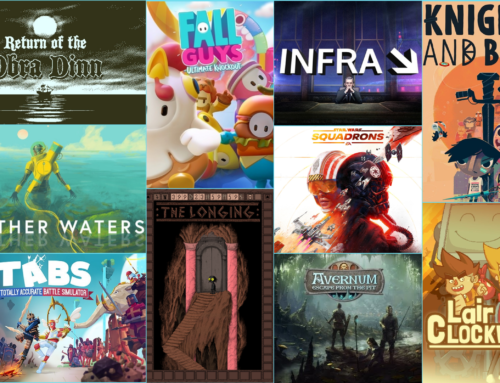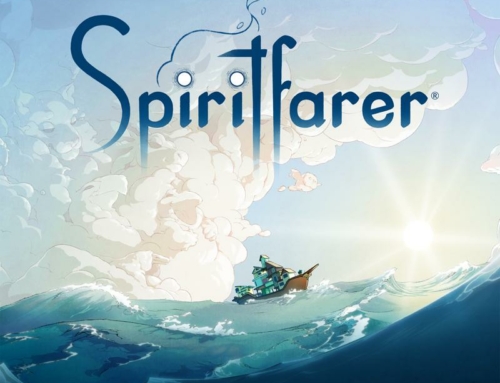Now with more sentences!
Welcome to my fifth annual list of all the games I played in the last year. This year, I’m making a change: the rule is “~1 sentence” so in a few cases I can avoid bending over to construct a run-on sentence if there is something in-depth to say. As usual, an * after the game’s title means I completed it. Games from previous years may reappear if I played a lot of them this year – inevitably I have at least one more sentence to say!
Additionally, from January through May, I played a number of games as part of an archiving project with Seattle’s Museum of Popular Culture. For the sake of professionalism, I’m not giving my unbridled opinions on any of them and will just list them at the end; but suffice it to say that each and every one had something to offer, and the majority are downright great.
Games Played in 2016
1979 Revolution: Black Friday*
A ramshackle game that coasts on the novelty of its (very interesting) subject matter; see the Game Club series for more.
Banner Saga 2*
A near-perfect iterative sequel that builds upon all of the original game’s systems and setpieces, though it hasn’t stuck with me as much. This may be because it’s very much the middle part of a trilogy, and won’t feel truly concluded till the third game.
The Beginner’s Guide*
A deeply personal, thought-provoking work that serves as (among other things) a celebration of the ’90s/early ’00s modding scene.
Blood Bowl 2*
I spent five months in the upper tiers of a highly competitive league despite winning only one out of 12 games. This experience of bitter futility, with occasional mad glimmers of optimism, was good practice for watching American government go down the toilet later in the year.
The Deer*
So barren of content I can’t come up with a sentence to say about it.
Deus Ex: Mankind Divided*
I have never played a sequel that so resolutely failed to justify its existence.
Dex*
I really like the idea of a side-scrolling Deus Ex like, but…uh…I bounced off this for reasons I can only vaguely remember. I really need to write these sentences over the course of the year rather then in December.
Dishonored: The Knife of Dunwall*
DLC that’s at least on-par with the base game, with a more compelling lead character to boot!
Dishonored: The Brigmore Witches*
More great level design, but absolutely kills a promising character arc by focusing on a battle with a ridiculous pop-up villain.
Divinity: Original Sin EE*
This wonderful game is really, really long – I was around 90 hours when I finished it (a little bit of that is idling, but that’s 80 hours of gameplay at least) and that was a hair too much. I made it across the finish line because it is that good and I was stubborn, but here’s hoping the sequel is a little more…focused.
Dr. Langeskov, The Tiger, and The Terribly Cursed Emerald: A Whirlwind Heist*
It’s good for what it is – and it’s free! – but it’s so emulative of The Stanley Parable (which was already remade once!) that it’s hard to evaluate it on its own terms.
Dreamfall: Chapters*
Dreamfall: Chapters managed to go way over-time and over-budget, being a far longer game than originally planned, and yet somehow still has a rushed ending that unsatisfactory resolves unanswered questions from 2006’s Dreamfall. I can only hope this will be improved upon in the upcoming Final Cut.
Driver: San Francisco
There is a particular kind of brilliant stupidity only achievable by video games who completely embrace the medium’s power for absurd fantasy, and Driver: San Francisco is one of its torchbearers.
Dropsy*
As strange as its title character, Dropsy is a silent adventure game that is very much an auteur work, and one I found (to my surprise) deeply affecting.
Duelyst
Without a doubt the best of the Hearthstone-likes, though I still struggle with the business model of CCGs (even free-to-play ones).
Dyscourse*
Essentially a deserted island castaway choose-your-own-adventure, Dyscourse is a little short on meat but long on charm, and the sort of hyper-accessible storygame I’d curate to someone intimidated by the medium.
Endless Legend*
Given the radical playstyle differences between factions and a surfeit of high-quality expansions, I could happily play this once a year for the next decade.
Everybody’s Gone to the Rapture*
Its formal conservatism is disappointing for anyone who followed the ambitious early development plans of making a full, time-limited living world, but this is still the second-best first-person explorer since Dear Esther, and evokes rural England in a way that few games have proved willing or able to do.
Firewatch*
Firewatch injects energy into the often static first-person exploration genre with a novel focus on the relationship between two characters and a historically-grounded world that you reside in as much as you explore. Contender for my Game of the Year.
Freshmen Year*
I know for a fact I played and finished this but remember nothing about it. I’m getting old.
Grim Dawn
If I’m playing an action-RPG, I want shallow as well as cognitive pleasures. Grim Dawn may have a fantastic, well-balanced class system, it may nail the kinetic click-combat of the genre’s best, but it’s brown and ugly and the dialog shoots write past uninspired to arrive at ungrammatical.
Grim Fandango Remastered*
The director’s commentary goes above and beyond by featuring 16 members of the original development team, and the game itself has aged flawlessly (there are some wonky puzzles, but that was equally true in 1998). Tony Plana as Manny Calavera remains my favorite vocal performance in all of video gaming.
Gwent (Beta)
I’m deeply concerned by the departure of the lead dev on a game pitched primarily on its generosity; in the beta, there is zero sign that that pay-to-win elements endemic to the genre have been more than slightly curtailed.
Hearthstone
I played Hearthstone for the first half of the year in a continued act of self-loathing, but have finally moved on; the fact that Blizzard won’t let me gift my massive collection of cards is just one more reason to begrudge the game.
Her Story*
My criticism from last year stands, but I really, really like the performance of ‘The Twa Sisters‘ (aka Dreadful Wind and Rain), even if it’s completely ridiculous in the context of the story.
HEX: Shards of Fate*
Beats Magic at its own game, and the devs take full advantage of this fact; this is more comparable to Magic Online than a proper free-to-play game, and you’re going to pay for the pleasure. However, the single-player campaign is both proper free and greatly enjoyable.
Highlands
Basically a cel-shaded Risk-like with a fantasy story slapped on it, Highlands is a game that deserves more of my time but failed to get it in one of the all-time best years for video games.
House of the Dying Sun*
For 17 years following the release of Freespace 2, the combat space sim has been wandering in the darkness, trying to figure out how to iterate on that masterpiece. House of the Dying Sun cuts out the genre’s fat, delivering an accessible, lightning-fast space action game playable on a gamepad. Easy to learn, difficult to master, this is the first space sim in a generation to look forward rather than back.
Human Resource Machine
One of the best ways to learn the fundamentals of coding.
Infinite Space III: Sea of Stars
Infinite Space has lost some of its magic simply by virtue of how many imitators it has spawned in the 11 years since Weird Worlds (most notably FTL).
Kaiju-a-gogo
On one hand, this feels way too grindy and drawn-out for its own good; on the other, there is a surprisingly lack of Rampage-likes and even fewer with a solid strategic layer.
Kathy Rain*
The first half sets up a wonderful, character-driven mystery, and it’s unfortunate that the game ultimately escapes into cliches in order to resolve it. A promising first effort that begs for a sequel.
Kentucky Route Zero, Act IV*
Even without reading Kill Screen’s story of the game’s protracted development, the sheer technical and artistic ambition on display here is enough to explain (and justify) the wait. At the same time, it feels like a filler episode in a way that none of the first three do; I suspect it will play better once the series is finalized and the player can move directly into the finale.
Kingdoms of Amalur: Reckoning
On one hand, Kingdoms of Amalur: Reckoning features one of the best combat systems ever seen in an action-RPG; on the other hand, a team of writers appears to have spent a considerable amount of time and effort to craft the most banal, generic fantasy world ever put to pixel, and then created a text-dump dialog system reminiscent of early Ultima so that you could hear all about how boring it is.
Mad Max*
Sometimes I get the urge to drive around a desert in a car; Mad Max scratched that itch good.
The Magic Circle
I can’t decide if the metatextual, player-as-game-hacker narrative and world of The Magic Circle is too clever for its own good, or just clever enough. Regardless, the implicit narrative (in an alternate universe, the original System Shock entered decades of development hell and became a broken, unfinished fantasy game) is delightfully niche.
Magic Duels: Origins
Weirdly, Magic: Duels has most generous free-to-play model of any current CCG (it understands that the digital nature of cards means they can guarantee you never draw unneeded duplicates, which raises the obvious question of why every other CCG gives you cards you literally can’t use).
Mario Kart 8
In every generation, there is a Mario Kart, and in every generation it is one of the best games to play with strangers.
Moon Hunters*
The combat is a bit too repetitive to give this the replayability it needs, but the art, music, and very intentional experiment in mythmaking make this a comfortable co-op experience.
Nelly Cootalot: The Fowl Fleet*
Oozing with charm, this is the best of the many love letters to Monkey Island, and yet Steamspy assures me that basically nobody bought it.
Pillars of Eternity: The White March (Parts 1 and 2)*
Part 1 is basically an ode to Icewind Dale, part 2 doubles down on Pillars’ core themes and is the equal to its best quests. Yet the nature of the original game’s ending meant the developers had to insert this into the middle of the base game rather than after the finale. Given that the main criticism of Pillars is that it’s a slow burn overloaded with content, this strikes me as too much of a good thing.
Rebel Galaxy
A very impressive technical achievement for a two-person team, even if it’s a little too ambitious for those limitations (though this didn’t stop them from building a entire soundtrack modeled after Firefly’s country rock).
Regency Solitaire
The first premium solitaire game I have ever played, and by extension the best, though I’m not sure the smattering of Austenian tropes was really necessary.
Richard & Alice*
Richard and Alice had the honor of being the very first game played for game club – check out our response here.
Rocket League
The epitome of “easy to learn, difficult to master,” Rocket League’s enormous success is due to the fact that it is enjoyed equally by casual gamers and hardcore e-sports jockeys.
Shadowrun: Hong Kong (Epilogue Campaign)*
A lovely epilogue that reminds me of high-quality Neverwinter NIghts mods; these engines lend themselves well to short-form works (as the mechanics are a bit limited to sustain a long game).
The Silent Age*
Drops the ball in exploring the ‘stupidity’ of its main character – the authors can’t decide if he’s sharp (and just uneducated) or dumb as a stump, and also can’t decide if this is funny or not.
Sorcery!*
A pleasant adaptation of an old gamebook that will appeal most to those nostalgic for that genre, or looking for a light-RPG easily playable on a tablet – but even others will want to play it just to get prepped for the sequels.
Sorcery! 2*
Expands the basic storybook gameplay of Sorcery 1 into a full-blown puzzle adventure; strikes an excellent balance between retro fantasy and high-quality original content.
Sorcery! 3 – The Seven Serpents*
Multiple layers of time travel and enormous non-linearity make this not only the best Sorcery! game, but one of the best RPGs of recent years.
Sorcery 4 – The Crown of Kings [Not actually played]
After picking up everything not nailed down (and a few things that were) in the first three Sorcery! games and building a super character for the finale, I lost my save switching computers. As such, I will not be able to play this until I find the time and motivation to replay the first three 🙁
Star Wars: Commander
I played this for three reasons: to gain first-hand experience in mainstream microtransaction-based mobile games, to test out the new Windows Store, and to investigate Disney’s mandate that all Star Wars video games are now full canon. Conclusion: All three are terrible.
Stellaris
At launch, this is a solid, thoughtful 4X game with a slow middle and no real win conditions; after years of high-quality Paradox expansions and DLC, I expect it to be one of the greatest space games ever made.
Submerged
There’s a fine line between relaxing and boring, and Submerged (pretty as it is) fell on the wrong side of that for me.
Subnautica
The idea of a Minecraft-like with a designed (rather than randomly-generated) underwater world is an interesting one, and even in its unfinished state the game is engaging and beautiful, but I’m waiting for it to exit Early Access to really dig in.
Sunless Sea: Zubmariner
Zubmariner is the rare expansion that makes the base game noticeably easier due to a ‘filled in’ map with more opportunities for trade and resupply; but given how punishing the base game is, this isn’t really a bad thing.
SUPERHOT*
A near-perfect execution of one of the better high-concept game jam ideas of this century; backers got exactly what they asked for.
Super Smash Bros. for Wii U
I’ve barely scratched the surface of this, but I can say that it features the pinnacle of character animation.
The Talos Principle
Probably the best first-person puzzler since Portal, though whereas that famously left players wanting more, The Talos Principle is so packed full of content that I didn’t get close to finishing it (though I haven’t given up).
Tharsis
I like digital board games, but they should be either less dice-reliant or more forgiving than Tharsis.
Tyranny*
An unusually small, focused RPG, Tyranny‘s quest design and fairly typical string of combat encounters prevent it from living up to its enormous ambitions, but it succeeds in having one of the most nuanced, interesting explorations of the nature of evil in the medium.
VA-11 Hall-A: Prologue*
Sold me on the full game based on its humor alone; it’s also worth playing as an insight into the design process (as the core mechanics changed between this vertical slice and the commercial release).
VA-11 Hall-A: Cyberpunk Bartending Action*
The best visual novel I have ever played, VA-11 Hall-A manages to both step beyond anime/manga tropes and the genre’s sexual focus to deliver what is, in fact, a high-quality novel.
The Vanishing of Ethan Carter
The best thing I can say about Ethan Carter is that it’s miles beyond Myst (a clear inspiration), but the open-world design and lack of any clear hints meant I frequently found myself wandering in search of the next puzzle, to the point where I drifted on the other games.
Warhammer End Times: Vermintide
I’ve never gotten into Left 4 Dead and its successors simply because they are best played with actual friends, and the community has a reputation for being toxic to newcomers who aren’t experts; Vermintide corrects this with a wide spate of difficulty levels and some clever gating that forces newbies to play with each other (or with people who want to help them). It also employs the Warhammer license better than any computer game yet.
Westerado: Double Barreled*
I‘m really glad I finished this; it is not a game that is made by the ending, but the ending perfectly fits the journey in a way that most game conclusions don’t.
Witcher 3: Hearts of Stone*
A more-of-the-same expansion, except ‘the same’ here is ‘the best RPG quests in all of gaming,’ so it’s a fantastic time even though one of the base games’ charms is that it has absolutely no need for expansions.
Witcher 3: Blood and Wine*
Best described by Richard Cobbett as “a victory lap,” Blood and Wine is almost minor fare compared to the larger stakes of the Witcher saga, but a slightly milquetoast main questline doesn’t stop this from being a lovely epilogue to Geralt’s long journey.
World of Warships
The “World of” series has made buckets of money by taking a page from the Gear of War design playbook and making a really, really good five-minute action game that loops endlessly. I can respect its quality, but (as evidenced by the enormous number of games I played this year) I need a certain amount of novelty and variety in what I play.
Games I Helped Archive
The Bridge
Dark Echo
GALAK-Z
Gravity Ghost*
The Last Door: Season 2
Lovers in a Dangerous Spacetime
Lumino City
Metamorphabet*
Plug & Play*
Quadrilateral Cowboy*
Sentris
Shelter 2*
Sunset*
Year Walk*





Leave A Comment